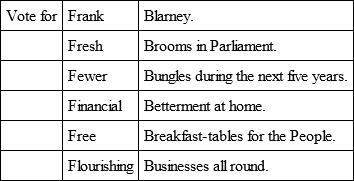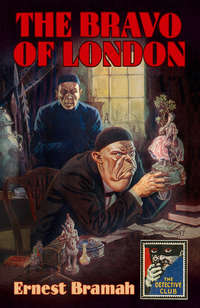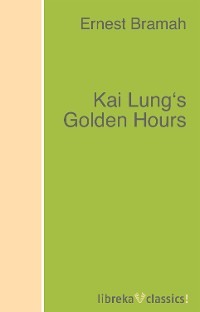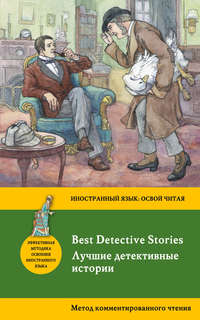 полная версия
полная версияThe Secret of the League: The Story of a Social War

Bramah Ernest
The Secret of the League: The Story of a Social War
CHAPTER I
IRENE
"I suppose I am old-fashioned" – there was a murmur of polite dissent from all the ladies present, except the one addressed – "Oh, I take it as a compliment nowadays, I assure you; but when I was a girl a young lady would have no more thought of flying than of" – she paused almost on a note of pained surprise at finding the familiar comparison of a lifetime cut off – "well, of standing on her head."
"No," replied the young lady in point, with the unfeeling candour that marked the youthful spirit of the age, "because it wasn't invented. But you went bicycling, and your mothers were very shocked at first."
"I hardly think that you can say that, Miss Lisle," remarked another of the matrons, "because I can remember that more than twenty years ago one used to see quite elderly ladies bicycling."
"After the others had lived all the ridicule down," retorted Miss Lisle scornfully. "Oh yes; I quite expect that in a few more years you will see quite elderly ladies flying."
The little party of matrons seated on the Hastings promenade regarded each other surreptitiously, and one or two smiled slightly, while one or two shuddered slightly. "Flying is very different, dear," said Mrs Lisle reprovingly. "I often think of what your dear grandfather used to say. He said" – impressively – "that if the Almighty had intended that we should fly, He would have sent us into the world with wings upon our backs."
There was a murmur of approval from all – all except Miss Lisle, that is.
"But do you ever think of what Geoffrey replied to dear grandpapa when he heard him say that once, mother?" said the unimpressed daughter. "He said: 'And don't you think, sir, that if the Almighty had intended us to use railways, He would have sent us into the world with wheels upon our feet?'"
"I do not see any connection at all between the two things," replied her mother distantly. "And such a remark seems to me to be simply irreverent. Birds are born with wings, and insects, and so on, but nothing, as far as I am aware, is born with wheels. Your grandfather used to travel by the South Eastern regularly every day, or how could he have reached his office? and he never saw anything wrong in using trains, I am sure. In fact, when you think of it you will see that what Geoffrey said, instead of being any argument, was supremely silly."
"Perhaps he intended it to be," replied Miss Lisle with suspicious meekness. "You never know, mother."
Such a remark merited no serious attention. Why should any one, least of all a really clever young man like Geoffrey, deliberately intend to be silly? There was too often, her mother had observed, an utter lack of relevance in Irene's remarks.
"I think that it is a great mistake to have white flying costumes as so many do," observed another lady. "They look – but perhaps they wish to."
"Certainly when they use lace as well it really seems as though they do. Oh!"
There was a passing shadow across the group and a slight rustle in the air. Scarcely a dozen yards above the promenade a young lady was flying strongly down the wind with the languid motion of the "swan stroke." She wore white – and lace trimming. Mrs Lisle gazed fixedly out to sea. Even Irene felt that the vision was inopportune.
"There are always some who overdo a thing," she remarked. "There always have been. That was only Velma St Saint of the New Gaiety; she flies about the front every day for the advertisement of the thing: I wonder that she doesn't drop handbills as she goes. There's plenty of room up on the Castle Hill – in fact, you aren't supposed to fly west of the Breakwater – but there will always be some – " A vague resentment closed the period.
"Are you staying at the Palatial this time?" asked the lady who had mentioned lace, feeling it tactful to change the subject. "I think that you used to."
"Oh, haven't you seen?" was the reply. "The Palatial has been closed for the last six months."
"Yes, it's a great pity," remarked another. "It looks so depressing too, right on the front. But they simply could not go on. I suppose that the rates here are something frightful now."
"Oh, enormous, my dear; but it was not that alone. The Palatial has always aimed at being a 'popular' hotel, and so few of the upper middle class can afford hotels now. Then the new tax on every servant above one – calculated as fifty per cent. of their wages, I think, but there are so many new taxes to remember – proved the last straw."
"Yes, it is fifty per cent. I remember because I had to give up my between-maid to pay the cook's tax. But I thought that hotels were to be exempt?"
"Not in the end. It was argued that hotels existed for the convenience of the monied classes, and that they ought to pay for it. So a large number of hotels are closed altogether; others work with a reduced staff, and a great many servants have been thrown out of employment."
Miss Lisle laughed unpleasantly. "A good thing, too," she remarked. "I hate hotel servants. So does everybody. It is the only good thing I have heard of the Labour Government doing."
"I am sure I don't hate them," said Mrs Lisle, looking round with pathetic resignation, "although they certainly had become rather grasping and over-bearing of late. But it was quite an unforeseen development of the scheme that so many should lose their places. Indeed the special object of the tax was to create a fund – 'earmarked' I think they call it – out of which to meet the growing pension claim, now that so few of the servant class think it worth while to save."
Miss Lisle laughed again, this time with a note of genuine amusement.
("A most unpleasant girl, I fear," murmured the lady who had raised the white costume question, to her neighbour in a whisper: "so odd.")
"It made a great difference at the registry offices. There are a dozen maids to be had any day where there were really none before. Only one cannot afford to keep them now."
There was a word, a sigh, and an "Ah!" to mark this point of agreement among the four ladies.
"I am afraid that the Government confiscation of all dividends above five per cent. bears very heavily on some," remarked one after a pause. "I know a poor soul of over sixty-five, nearly blind too, whose husband had invested all his savings in the company he had worked for because he knew that it was safe, and, having a good reserve, intended to pay ten per cent. for a long time. When he died it brought her in fifty pounds a year. Now – "
There were little signs of sympathy and commiseration from the group. The sex was beginning to take an unwonted interest in terms financial – per centage, surrender value, trustee stock, unearned increment, and so on. They had reason to do so, for revolutionary finance was very much in the air, or, rather, had come tangibly down to earth at length: not the placid city echoes that were wont to ripple gently across the breakfast-table a few years earlier without leaving any one much better or much worse off, but the galvanic adjustment that by a stroke made the rich well-to-do, the well-to-do just so-so, the struggling poor, and left the poor where they were before. The frenzied effort that in a session strove to tear up the trees of the forest and leave the plants beneath untouched; to pull to pieces the intertwined fabric of a thousand years' growth and to create from it a bundle of straight and equal twigs; in a word, to administer justice on the principle of knocking out one eye in all the sound because a number of people were unfortunately born or fallen blind.
"Five and twenty," mused Mrs Lisle. "I suppose it is just possible."
"It is really less than that," explained the other. "You may have noticed that as it is now no good making more than five per cent., most companies pay even less. There is no incentive to do well."
"One hears of even worse cases on every hand," said another of the ladies. "I am trying to interest people in a poor deformed creature whose father left her an annuity derived from ground rents in the City… As it has been worked out I think that she owes the Incomes Adjustment Department lawyers something a year now. But private charity seems almost to have ceased altogether. Have you heard that 'Jim's' is closed?"
It was true. St James's Hospital, whose unvarnished record was, "Three hundred of the very poor treated freely each day," was a thing of the past, and across its portal, where ten years before a couple of stalwart gentlemen wearing red ties had rested for a moment, while they lit their pipes, a banner with the strange device, "Curse your Charity!" now ran the legend, "Closed for want of Funds."
"I wonder sometimes," mused the last speaker, "why some one doesn't do something."
"But," objected another, "what is there to do? What is there?"
They all agreed that there was nothing – absolutely nothing. Every one else was tacitly making the same admission; that was the fatal symptom.
Miss Lisle jumped up and began to move away unceremoniously.
"Where are you going, dear?" asked her mother in mild reproof.
"Oh, anywhere," replied Irene restlessly.
"But what for?" persisted Mrs Lisle.
"Oh, anything."
"That is 'nothing,' Miss Lisle," smiled the tactful lady of the party, anxious to smooth over the awkwardness of the moment.
"No, it is at least something," flung back the girl brusquely; and with swinging strides she set off at a furious pace towards the open country.
"Irene is a little impulsive at times," apologized her mother, sitting back with placidly folded hands.
CHAPTER II
THE PERIOD, AND THE COMING OF WINGS
An intelligent South Sea Islander, who had been imported into this country to stimulate missionary enterprise, on his return had said that the most marked characteristic of the English of the period was what they called "snap."
The nearest equivalent in his own language signifying literally "quick hot words," he had some difficulty in conveying the impression he desired, and his circle had to rest content that "snap" permeated the journalism, commerce, politics, drama, and social life of the English, had assailed their literature, and was beginning to influence religion, art, and science. It may be admitted that the foreign gentleman's visit had coincided with a period of national stress, for the week in question had embraced the more entertaining half of a general election, seen the advent of two new farthing daily papers, and been marked by the Rev. Sebastian Tauthaul's striking series of addresses from the pulpit of the City Sanctum, entitled "If Christ put up for Battersea." It had also included the launching of a new cocoa, a new soap, and a new concentrated food.
The new food was called "Chip-Chunks." "A name which I venture to think spells success of itself," complacently remarked its inventor. "A very good name indeed," admitted his advertising manager. "It has the great desideratum that it might be anything, and, on the other hand, it might equally well be nothing." "Just so," said the inventor with weighty approval; "just so." A "snap-line" was required that would ineradicably fix Chip-Chunks in the public mind, and "Bow-wow! Feel chippy? Then champ Chip-Chunks" was found in an inspired moment. It was, of course, fully cooked and already quite digested. It was described as the delight of the unweaned infant, the mainstay of the toothless nonagenarian, and so simple and wholesome that it could be safely taken and at once assimilated by the invalid who had undergone the operation of having his principal organ of digestion removed. So little, indeed, remained for nature and the human parts to do in the matter of Chip-Chunks as to raise the doubt whether it might not be simpler and scarcely less nutritive to open the tin and pour the contents down the drain forthwith.
As Chip-Chunks was designed for those who were disinclined to exercise the functions of digestion, so Isabella soap made an appeal to those who disliked work and had something of an antipathy to soap at all. One did not wash with Isabella, it was assured: one sat down and watched it. It had its "snap-lines," too:
"You write it 'wash,' but you call it 'wosh.'
"What is the difference?
"There is 'a' difference.
"There is also 'a' difference between Isabella soap and all other soaps:
"All the difference.
"That's our point. Put it in your washtub and watch it."
Cocoa was approached in a more sober spirit. Soap may blow bubbles of light and airy fancy, pills ricochet from one gay conceit to another, meat extracts gambol with the irresponsible exuberance of bulls in china cups, but cocoa relied upon sincerity and statistics. Kingcup cocoa was the last word of the expert. It won its way into the great heart of the people by driving home the significant fact that it contained .00001 per cent. more phosphorus, and .000002 per cent. less of something fatty, than any other cocoa in existence. When the newspaper reader of the period had been confronted by this assertion, in various guises, seventeen thousand times, he had reached a state of mind in which .00001 per cent. more phosphorus and .000002 per cent. less fat represented the difference between vigorous manhood and drivelling imbecility.
The Rev. Sebastian was all "snap." His topical midday addresses – described by himself as "Seven minutes sandwich-sermonettes" – have already been referred to. Young men who were pressed for time were bidden to bring their bath buns or buttered scones and eat openly and unashamed. Workmen with bread and cheese and pots of beer were welcomed with effusion. This particular series extended over the working days of a week, and was subdivided thus:
Monday.– The Issues before the Constituency.
Tuesday.– His Address to the Electors.
Wednesday.– The Day of the Contest.
Thursday.– Which Way are you Voting?
Friday.– Spoiled Papers.
Saturday.– At the Top of the Poll and the Leader of our Party.
Of the new papers, of their sprightliness, their enterprise, their general all-roundness, their almost wicked experience of the ways of the world, from a quite up-to-date fund of junior office witticism to a knowledge of the existence of actresses who do not act, outwardly respectable circles of society who play cards for money on Sunday, and (exclusively for the benefit of their readers) places where quite high-class provisions (only nominally damaged) could be bought cheap on Saturday nights, it is unnecessary to say much. Of their irresponsible cock-sureness, their bristling combativeness, their amazing powers of prophetic penetration, and, it must be confessed, their ineradicable air of somewhat second-rate infant phenomenonship, their crumbling yellow files still bear witness. As a halfpenny is half a penny, so a farthing is half a halfpenny, and the mind that is not too appalled by the possibilities of the development can people for itself this journalistic Eden.
The Whip described its programme as "Vervy and nervy; brainy and champagny." The Broom relied more on solider attractions of the "News of the World in Pin Point Pars" and "Knowledge in Nodules" order. Both claimed to be written exclusively by "brainy" people, and both might have added, with equal truth, read exclusively by brainless. Avowedly appealing "to the great intellect of the nation," neither fell into the easy mistake of aiming too high, and the humblest son of toil might take them up with the fullest confidence of finding nothing from beginning to end that was beyond his simple comprehension.
But the most cursory review of national "snappishness" would be incomplete if it omitted the field of politics, especially when the period in question contained so concentrated an accumulation of "snap" as a general election. Contests had long ceased to be decided on the merits of individuals or of parties, still less to be the occasions for deliberate consideration of policy. Each group had its label and its "snap-cries." The outcome as a whole – the decision of each division with few exceptions – lay in the hands of a class which, while educated to the extent of a little reading and a little writing, was practically illiterate in thought, in experience, and in discrimination. To them a "snap-cry" was eminently suited, as representing a concrete idea and being in fact the next best argument to a decayed egg. That national disaster had never so far been evolved out of this rough-and-ready method could be traced to a variety of saving clauses. At such a time the strict veracity of the cries raised was not to be too closely examined; indeed, there was not the time for contradiction, and therein lay the essence of some of the most successful "snaps."
Misrepresentation, if on a sufficiently large scale, was permissible, but it was advisable to make it wholesale, lurid, and applied not to an individual but to a party – emphasising, of course, the fact that your opponent was irretrievably pledged to that party through thick and thin.
In other words, it was quite legitimate for A to declare that the policy of the party to which his opponent B belonged was a policy of murder, rapine, piracy, black-mail, highway robbery, extermination, and indiscriminate bloodshed; that they had swum to office on a sea of tears racked from the broken hearts of an outraged peasantry, risen to power on the apex of a smoking hecatomb of women and children, and kept their position by methods of ruthless barbarism; that assassination, polygamy, thuggeeism, simony, bureaucracy, and perhaps even an additional penny on the poor man's tea, would very likely be found included in their official programme; that they were definitely pledged to introduce Kalmucks and Ostyaks into the Government Dock-yards, who would work in chained gangs, be content with three farthings for a fourteen hours' day, and live exclusively on engine waste and barley-water.
This and much more was held to be fair political warfare which should not offend the keenest patriot. But if A so far descended to vulgar personalities as to accuse B himself of employing an urchin to scare crows at eightpence a day when the trade union rate for crow-scaring was ninepence, he stood a fair chance of having an action for libel or defamation of character on his hands in addition to an election.
Under such a system the least snappy went to the wall. Happy was the man who was armed not necessarily with a just cause, but with a name that lent itself to topical alliteration. Who could resist the appeal to

– especially when it was coupled with the reminder that
Every vote given to A. J. Wallflower is a slice of bread filched from your innocent children's hard-earned loaf.
Of course the schools could not escape the atmosphere. The State-taught children were wonderfully snappy – for the time being. Afterwards, it might be noticed, that when the props were pulled away they were generally either annoyingly dull or objectionably pert, or, perhaps, offensively dully-pert, according to whether their nature was backward or forward, or a mixture of both. The squad-drilled units could remember wonderfully well – for the time; they could apply the rules they learned in just the way they were taught to apply them – for the time. But they could not remember what they had not been drilled to remember; they could not apply the rules in any other way; they could not apply the principles at all; and they could not think.
High and low, children were not allowed to think; with ninety-nine mothers out of a hundred its proper name was "idleness." "I do not like to see you sitting down doing nothing, dear," said every mother to every daughter plaintively. "Is there no sewing you might do?" So the would-be thoughtful child was harried into working, or playing, or eating, or sleeping, as though a mind contentedly occupied with itself was an unworthy or a morbid thing.
Yet it was a too close adherence to the national character that proved to be the undoing of Wynchley Slocombe, who is now generally admitted to have been the father of the form of aerial propulsion so widely enjoyed to-day. Like everybody else, he had read the offer of the Traffic and Locomotion Department of a substantial reward for a satisfactory flying-machine, embracing "any contrivance … that would by demonstration enable one or more persons, freed from all earth-support or connection (a) to remain stationary at will, at any height between 50 and 1500 feet; (b) at that height to travel between two points one mile apart within a time limit of seven minutes and without deviating more than fifty yards from a straight line connecting the two points; (c) to travel in a circle of not less than three miles in circumference within a time limit of fifteen minutes." Wynchley took an ordinary intelligent interest in the subject, but he had no thought of competing.
It was not until the last day of the period allowed for submitting plans that Wynchley's great idea occurred to him. There was then no time for elaborating the germ or for preparing the requisite specifications, even if he had any ability to do so, which he had not, being, in fact, quite ignorant of the subject. But he remembered hearing in his youth that when a former Government of its day had offered a premium for a convenient method of dividing postage stamps (until that time sold in unperforated sheets and cut up as required by the users), the successful competitor had simply tendered the advice, "Punch rows of little holes between them." In the same spirit Wynchley Slocombe took half a sheet of silurian notepaper (now become famous, and preserved in the South Kensington Museum) and wrote on it, "Fasten on a pair of wings, and practise! practise!! practise!!!" It was to be the aerial counterpart of "Gunnery! Gunnery!! Gunnery!!!"
Unfortunately, the departmental offices were the only places in England where "snap" was not recognised. Wynchley was regarded as a suicidal lunatic – a familiar enough figure in flying-machine circles – and his suggestion was duly pigeon-holed without consideration.
The subsequent career of the unhappy man may be briefly stated. Disappointed in his hopes of an early recognition, and not having sufficient money at his disposal to demonstrate the practicability of his idea, he took to writing letters to the President of the Board, and subsequently to waylaying high officials and demanding interviews with them. Dismissed from his situation for systematic neglect of duty, he became a "poor litigant with a grievance" at the Law Courts, and periodically applied for summonses against the Prime Minister, the Lord Mayor of London, and the Archbishop of Canterbury. Still later his name became a by-word as that of a confirmed window-breaker at the Government offices. A few years afterwards, a brief paragraph in one or two papers announced that Wynchley Slocombe, "who, some time ago, gained an unenviable notoriety on account of his hallucinations," had committed suicide in a Deptford model lodging-house.
In the meanwhile two plans for flying-machines had been selected as displaying the most merit, and their inventors were encouraged to press on with the construction under a monetary grant. Both were finished during the same week, and for the sake of comparison they were submitted to trial on the same day upon Shorncliffe plain. Vimbonne VI., which resembled a much-distended spider with outspread legs, made the first ascent. According to instructions, it was to demonstrate its ability to go in a straight line by descending in a field near the Military Canal, beyond Seabrook, but from the moment of its release it continued to describe short circles with a velocity hitherto unattained in any air-ship, until its frantic constructor was too dizzy to struggle with its mechanism any longer. The Moloch was then unmoored, and took up its position stationary at a height of 1000 feet with absolute precision. It was built on the lines of a gigantic centipede, with two rows of clubby oars beneath, and ranked as the popular favourite. Being instructed, for the sake of variety, to begin with the three mile circle, the Moloch started out to sea on the flash of the gun, the sinuous motion that rippled down its long vertebrate body producing an effect, accidental but so very life-like, that many of the vast concourse assembled on the ground turned pale and could not follow it unmoved…





